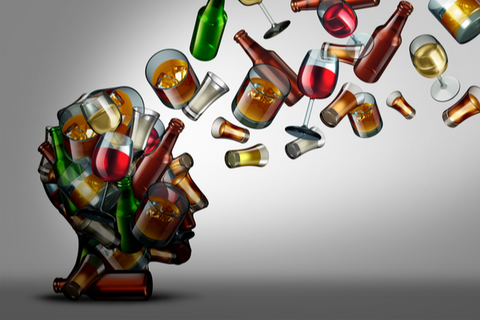A Glass Half Empty – The Effects of Underage Drinking
Blog · Apr 13, 2021

April is National Alcohol Awareness Month, and while this is a great time to focus on the effects of alcohol use, awareness is something to promote year-round. More than three decades ago, the National Council for Alcoholism and Drug Dependence (NCADD) began sponsoring a campaign to raise awareness of the causes, effects, and treatments of one of the nation’s greatest public health problems: alcoholism. Today, a large portion of the thrust behind Alcohol Awareness Month is to highlight the need for prevention education on the negative health consequences of underage alcohol use.
This year, to celebrate National Alcohol Awareness Month, we’re publishing a two part blog series on the negative effects of underage alcohol use and how to talk with teens about those risks. This week, we’ll present the long-term and short-term health consequences of underage drinking.
The parts of the brain still developing in adolescence and young adulthood include those responsible for decision making, judgment, impulse control, learning and processing information, and memory
The body and brain continue to develop well into a person’s twenties, and because they are still very much a work in progress, alcohol’s negative effects can be particularly detrimental to their growth trajectory. The parts of the brain still developing in adolescence and young adulthood include those responsible for decision making, judgment, impulse control, learning and processing information, and memory. Exposure to alcohol interferes with brain development and can have serious consequences on a teen’s present and future.
Short Term Effects
Alcohol affects every part of the body it encounters, but the most significant impact occurs in the brain. Alcohol is a depressant. It affects the central nervous system; particularly the spinal cord, cerebellum, and cerebral cortex, with detrimental effects on many neurotransmitter systems. The alcohol molecule is so small that it can easily enter the bloodstream and cross the blood brain barrier. As alcohol slows the nervous system, it suppresses key reflexes like breathing and the gag reflex. That means when significant amounts of alcohol have been consumed, it’s possible to vomit and choke or just stop breathing all together.
The parts of the brain responsible for sound judgement and controlling impulses are two notable functions affected by alcohol consumption. A teen who drinks faces limited decision-making ability, limited impulse control, and impaired motor function. Impaired physical coordination and control results in loss of balance, slurred speech, and blurred vision. Together with impaired impulse control, the effects of alcohol impairment can have significant harmful outcomes. This puts teens who drink at high risk for poor decision making including driving under the influence or choosing to ride in a car operated by an impaired driver
Long Term Effects
The adolescent brain continues developing well into a person’s twenties. Because the brain is still developing through the teenage years, many parts of the brain that are impaired in the short term when a teen drinks alcohol are affected in the long term by interrupted or delayed development.
Alcohol can disrupt this development affecting both brain structure and function. Damage to the hippocampus may cause cognitive or learning problems and may make the brain more prone to alcohol dependence. These risks increase with drinking at a young age and persist with low or moderate use as the areas of the brain repeatedly damaged by alcohol use do not regenerate or fully develop.
While the long-term effects of teen drinking can vary depending on exposure, drinking alcohol during the teenage years could interfere with the ability to process, learn, and remember new information. Alcohol-related brain damage can result in difficulty performing simple tasks like reading a map or following a series of directions as an adult.
Chronic alcohol use can damage the frontal lobes of the brain and cause a reduction in brain size. Other vital body systems are affected as well. The digestive system of heavy alcohol users is unable to absorb vitamin B-1 (Thiamine) presenting a greater risk of developing a syndrome known as Wernicke's Encephalopathy as the cerebellum is sensitive to Thiamine deficiency. Wernicke's Encephalopathy is characterized by impaired memory, confusion, and lack of coordination. Furthermore, people who start drinking before the age of 15 are four times more likely to become dependent on alcohol later in life.
Underage drinking can interfere with a person’s development into a healthy adult limiting their ability to reach their goals. The teen years are critical for physical and emotional development with significant cognitive development occurring during this stage. Alcohol consumption during development can cause irreparable harm in both the short and long term. Tune in for our next Alcohol Awareness Blog for best practices on talking with teens about the consequences of underage drinking and how to encourage them to resist internal and external pressures to use alcohol and other harmful substances.